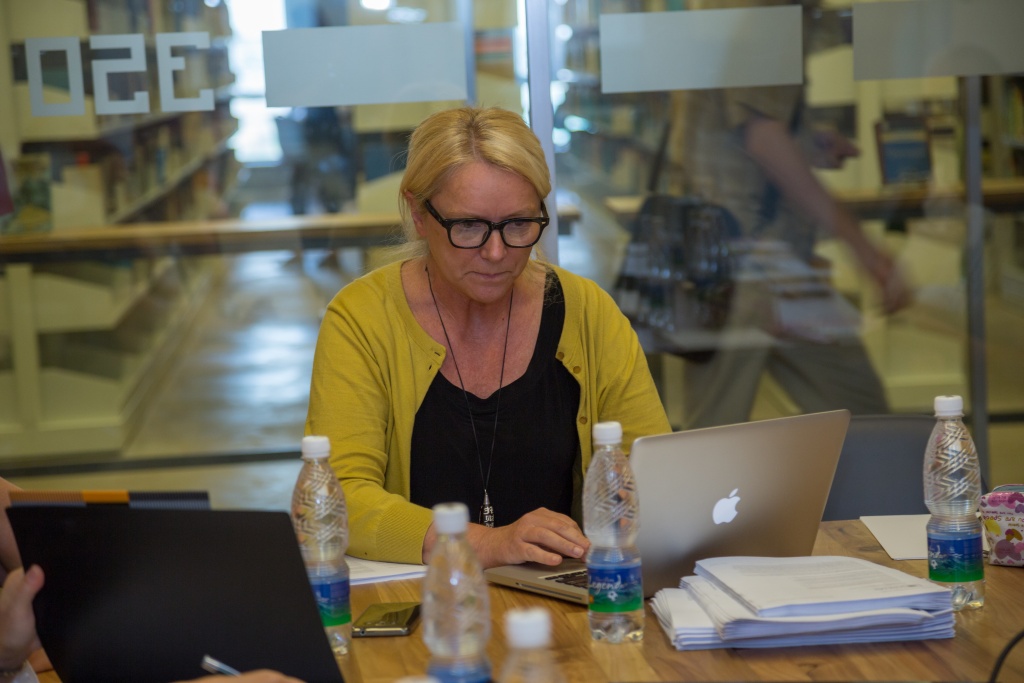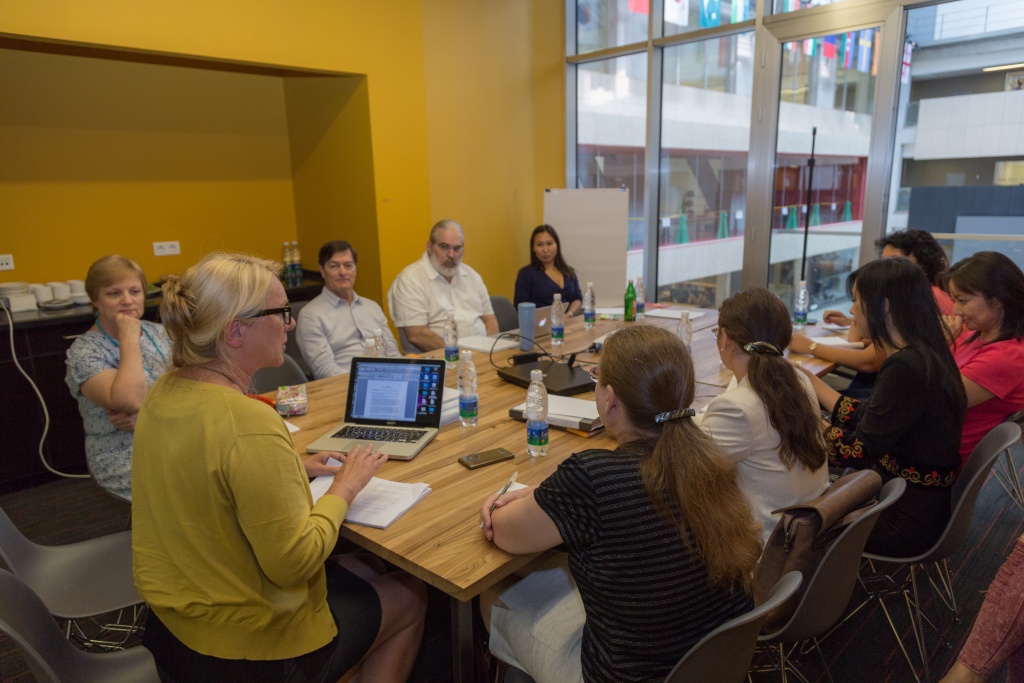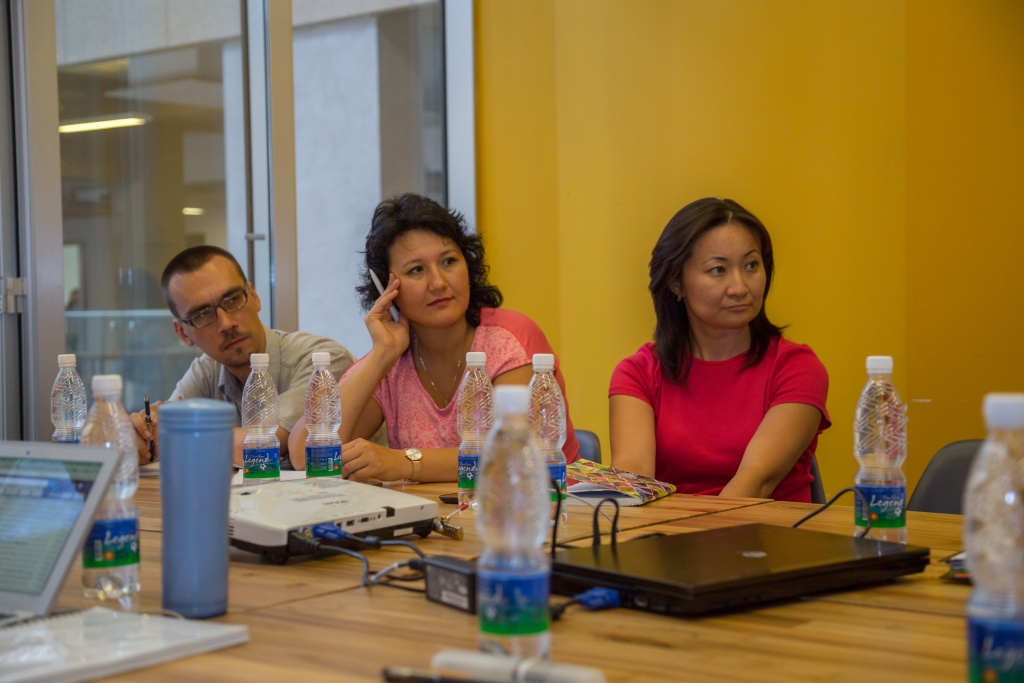Associate VP at Bard Institute for Writing & Thinking Peg Peoples conducts workshops with Faculty and Staff at AUCA
September 16, 2016
On September 7-11, 2016, Peg Peoples, the Associate Vice President for Education Initiatives at the Bard Institute for Writing & Thinking, visited the American University of Central Asia (AUCA) to meet and conduct workshops with faculty and staff members. She visited NGA, the WARC, FYS, GenEd, and talked with directors, faculty, and tutors.
Over the course of her two workshops, “Thinking Through Dialogue” and “How to do Things with Writing Prompts,” Peoples worked with the faculty and program directors on pedagogies which employed writing as an instrumental part of thinking. The participants read a variety of texts, wrote short essays, and grappled with other questions of teaching and writing. The workshops were interactive, incorporating every participant in each of the sessions. Peoples herself spoke with us about her visit to AUCA and her workshops.
 Partnership
Partnership
“I used to be at AUCA as the Bard representative, at which time I helped develop the liberal arts curriculum. A couple years ago, I was asked to come back to Bard and take on the position I have now. Recently, though, I was in Turkey, and I was encouraged to re-learn about AUCA, where a lot had changed while I’d been away. It’s been really exciting to meet with the people I already know and to really help think about the ways in which Bard can further support institutional development and program development at AUCA. We are partner institutions, and sometimes we have to review that relationship think about the ways we can make it more dynamic and useful.
“Initially, I came to AUCA as the director of College Writing. I helped to develop the orientation program, the Writing and Academic Resource Center (WARC), and the First Year Seminar (FYS). I taught FYS, but I also had a much larger role in the programing. The Institution for Writing and Thinking offers a lot of faculty support for professional development, and Bard itself also offers support for institutional development and specific program development. This support helps foster faculty collaboration between institutions and student projects, like a student conference. I am here to meet with faculty as well as the directors of different programs, FYS, and General Education to see what can we do to help, to support your programing, and to figure out how can we work together by making our dialogue more dynamic and instrumental towards a stronger conversation.”

Workshops
“This time, I have only done two workshops at AUCA. Generally, if I would come to do a workshop, I would do a week long workshop with faculty across multiple disciplines. Andrew and I spoke and decided that what I needed to do was meet with people. I at least wanted to do two short workshops. One, entitled “Thinking Through Dialogue,” covers a very important component of seminar classes. It was encouraging to see faculty there from FYS and NGA. The workshop examined the question “how do we think through dialogue?” The workshop helps those who have not taught a seminar format before understand the primary function of the seminar. That primary function is having students take responsibility for portions of the conversation by learning how to have a reasoned dialogue with each other. People often say the importance of the seminar is learning how to speak, how to present your ideas, how to have a dialogue. But, another important function of the seminar—50% of the dialog—is actually listening.
“The second workshop focused on writing-based teaching methodologies, specifically looking into how we as teachers can incorporate short writing assignments into classes instrumentally to meet learning objectives. There are a lot of new faculty, who had not yet been exposed to a writing-as-thinking pedagogy at AUCA. So how do you begin to develop this pedagogy, and how do you, in general, use writing as an instrument of thinking? You have to write! You have to incorporate these very short writing assignments into the classroom so they don’t feel like they are just an add-on. The assignments have to feel organic to the learning process and to the course itself. That is what the second workshop is about.”
Workshop usefulness
“Professors take these practices learned in the workshops back to their courses for their students. This is what professional development is about. These pedagogies make students better citizens. They make us go out into the community and be able to have better conversations, to ask very specific questions, and to know how to negotiate difficult conversations without getting upset. In short they give us speaking tools.”
“This is a part of the training that our colleagues from Bard carry out for our teachers regularly. The FYS course, which is offered for freshmen by AUCA, uses the same methodology as Bard. The methodology of the FYS course was authored, as far as I know, by the president of the college. The FYS method—the technique of intensive writing—involves each student of a group and contributes to the development so many important skills for freshmen. This exercise promotes the formation of structured and very clear voices. It develops the skills of speech, listening, and thinking. These trainings have been very helpful for me. When you use this technique regularly and teach it over a year, your students grow and develop,” said Irina Larionova, an FYS professor.

AUCA’s role in Central Asia
“I think AUCA’s role in Central Asia is unique, and I hope AUCA continues to believe in the essential vision of its role in Central Asia. AUCA doesn’t just provide professional education, you provide an education towards a future vision of who Kyrgyzstanis are as citizens and their roles both locally and globally. AUCA examines who its students are, not only academically, but also as developing citizens. There is a kind of spirit at AUCA saying, “we can do this,” saying, “we can be the agents of change in our own communities.” AUCA has a spirit that pushes for a cooperative, integrated, and sophisticated future.
“AUCA’s new campus is fabulous. I love it! I remember many conversations with Henry Myerberg, the architect. We did a research project with the faculty on classroom space, specifically on how classroom space could be arranged. It really is wonderful to see their vision of the AUCA community embodied in its architecture. It is an extraordinary achievement by AUCA and the leadership.”
